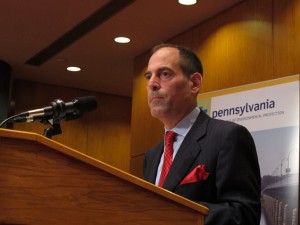Krancer Unveils Department of Environmental Protection Changes
-
Scott Detrow

Scott Detrow / StateImpact Pennsylvania
DEP Secretary Michael Krancer, announcing the department’s changes
Department of Environmental Protection Secretary Michael Krancer enjoys his sports metaphors. He framed those marathon Marcellus Shale Advisory Commission meetings as hockey games: the morning was the “first period,” the mid-afternoon was the “second period,” and when public comment dragged on, it was “overtime.” Speaking to natural gas drillers in Philadelphia earlier this month, he compared energy companies who violate the rules to Mark McGwire, who famously used steroid when he broke Major League Baseball’s single-season home run record in 1998.
Today, Krancer took his sports analogies to a new level, likening DEP’s organizational overhaul to the Pittsburgh Steelers. The problem, as Krancer explained, was that DEP’s internal departments weren’t communicating and coordinating with each other. “You don’t go see a Steelers game to see 11 guys running around doing their own thing. You go to see the Steelers team, working together, to win,” he said. “And what you saw on the Ravens day was a bunch of 11 guys at a time doing their own thing. And you saw what the result was. What you saw last week was more like it. That was the team, working together as a team.”
Confused? There was plenty more where that came from. “When the Steelers are working all on the same page as a team, you’ve got different guys with different talents, different athletic abilities, all working together as a team,” said Krancer, possibly auditioning for a slot on the NFL Network.
“You have Troy Polamalu in the defensive backfield with his athleticism – his unbelievable athleticism. You have these big, lumbering defensive linemen that are creating opportunities for Troy to go in there and pick off passes. So, it is a way of a team being able to not only not forget the individual differences and talents of regions and programs. It’s a way to maximize that difference, or those differences, all coming together to be able to deliver a win, if you’re the Steelers. Or a beautiful Mozart piece, if you’re a symphony. Or in our case, effective and consistent and sensible and predicable regulatory oversight.”
So there you go.
 Setting aside the Steelers for a moment, let’s take a look at Krancer’s announcement. The major news, as we reported yesterday, was the centralization of DEP’s natural gas regulators, into a new Oil and Gas Bureau. The office will be a “deputate,” which means it reports directly to a deputy secretary in Harrisburg. This “will integrate and unify Harrisburg and [r]egional personnel in this program into one structure to provide for unified regulation of the oil and gas industry,” Krancer wrote in an email to DEP employees.
Setting aside the Steelers for a moment, let’s take a look at Krancer’s announcement. The major news, as we reported yesterday, was the centralization of DEP’s natural gas regulators, into a new Oil and Gas Bureau. The office will be a “deputate,” which means it reports directly to a deputy secretary in Harrisburg. This “will integrate and unify Harrisburg and [r]egional personnel in this program into one structure to provide for unified regulation of the oil and gas industry,” Krancer wrote in an email to DEP employees.
Earlier this year, Krancer tried to push “consistency” and “clarity” in drilling oversight by requiring drilling inspectors to forward their notices of violation directly to DEP officials in Harrisburg, rather than the department’s six regional offices. He quickly retracted that directive, after intense, negative reaction from environmental groups, who worried the centralization would muzzle field inspectors. Today, Krancer said any comparison to that early move would be an “apples-to-oranges” link. DEP’s drilling-related operations will still maintain their regional autonomy, he promised, saying, “our regional differences, in terms of geology, in terms of geography, are not going to be lost in the shuffle. That is not the case. As a matter of fact, quite the opposite. … The regional interface is still going to be there. The same people are going to be there. The same inspectors are going to be there. Really, they’re not going to notice any new faces.”
The new oil and gas department isn’t the only change. Krancer is creating several new offices and bureaus, to oversee brownfield and acid mine drainage cleanup, among other tasks. He’s also shifting the priority of a department dedicated to alternative energy. The new office will now focus on pollution prevention.
In his all-staff email, Krancer framed the change as a way to streamline DEP’s operations. “As you are aware and as many of you have experienced and reiterated to me during my visits with you, the Department over the past few years began, to some degree, to drift away from its core mission of environmental protection,” he wrote. … “Consistency of enforcement and application of our laws and regulations is vitally important and you and others have heard me say that many times. I will continue to say that we are one DEP, not seven or twelve. Our goal is to increase cooperation, communication and coordination among and between us, making sure we apply the same law the same way everywhere and strictly and vigorously enforce that law to protect the environment and public health.”
“This reorganization will improve coordination among programs; enhance communication between program development and implementation staff; and ensure statewide consistency throughout the agency.”
















